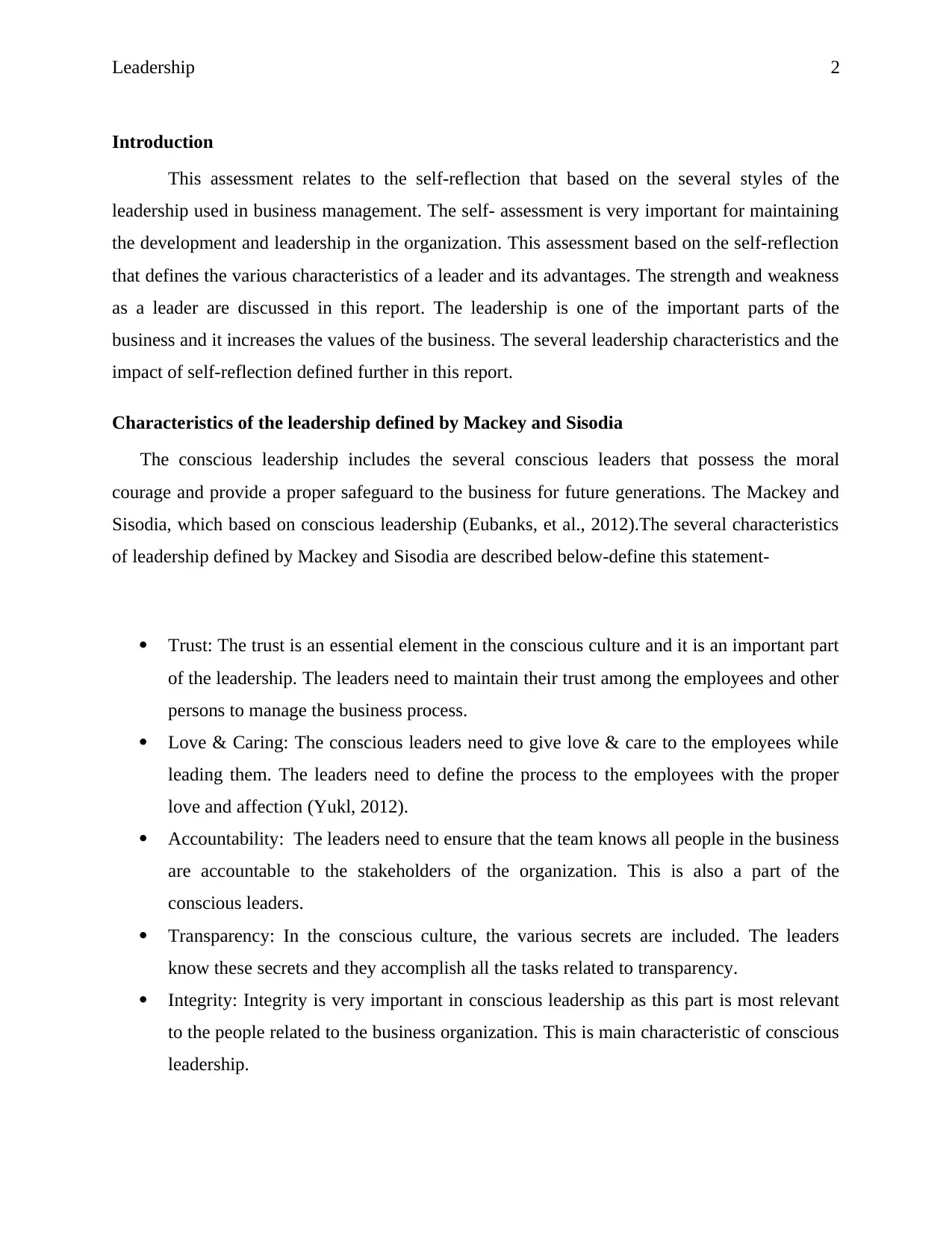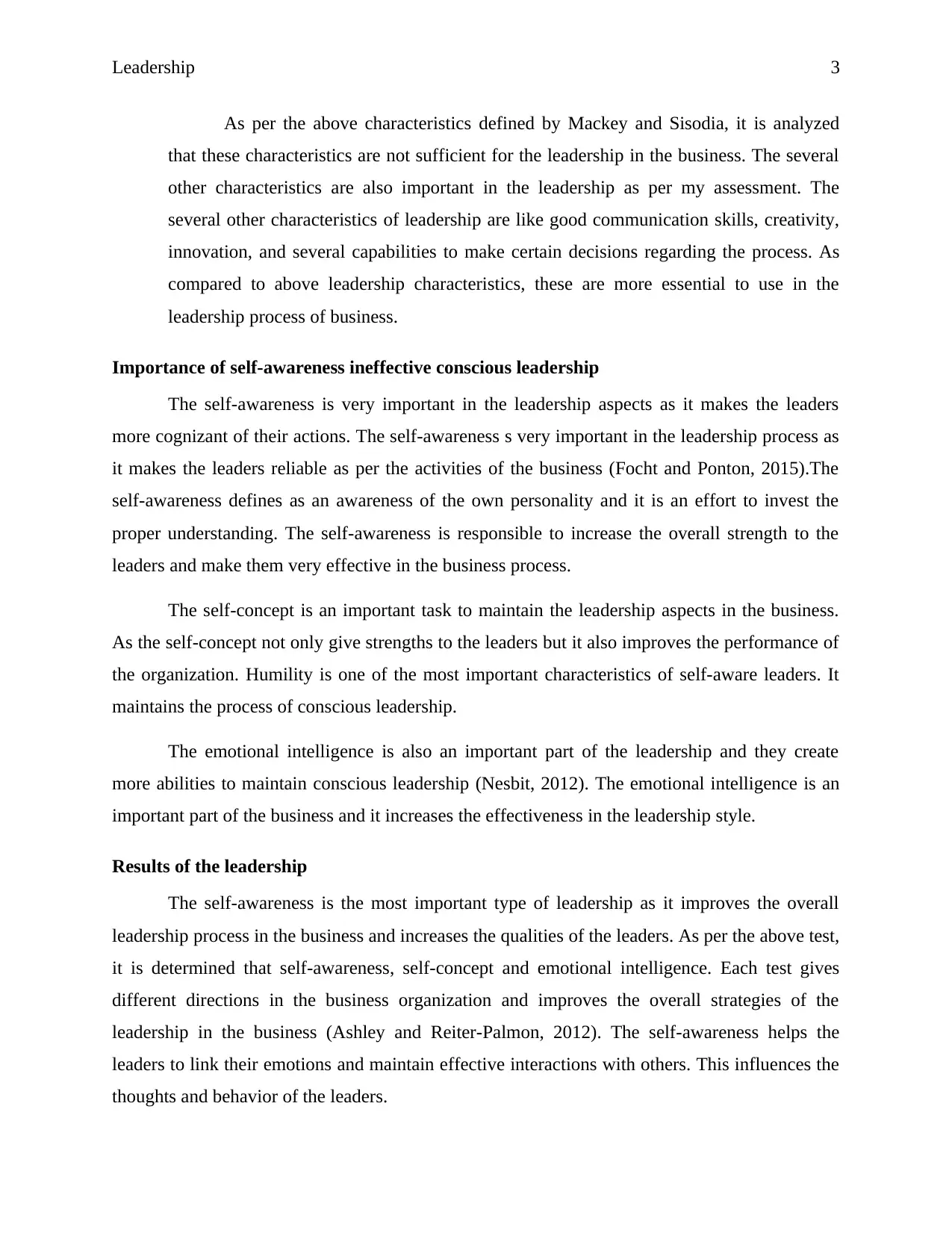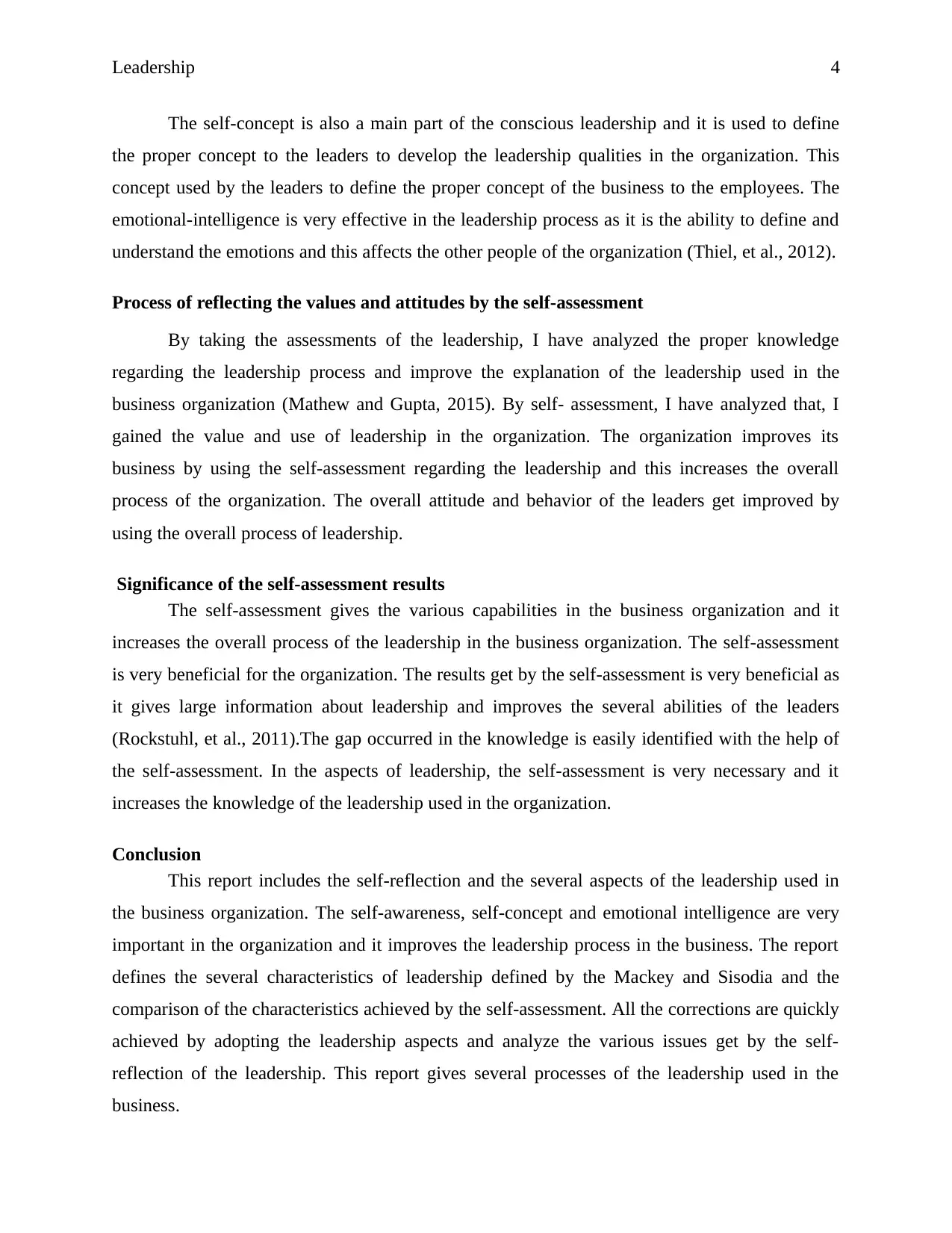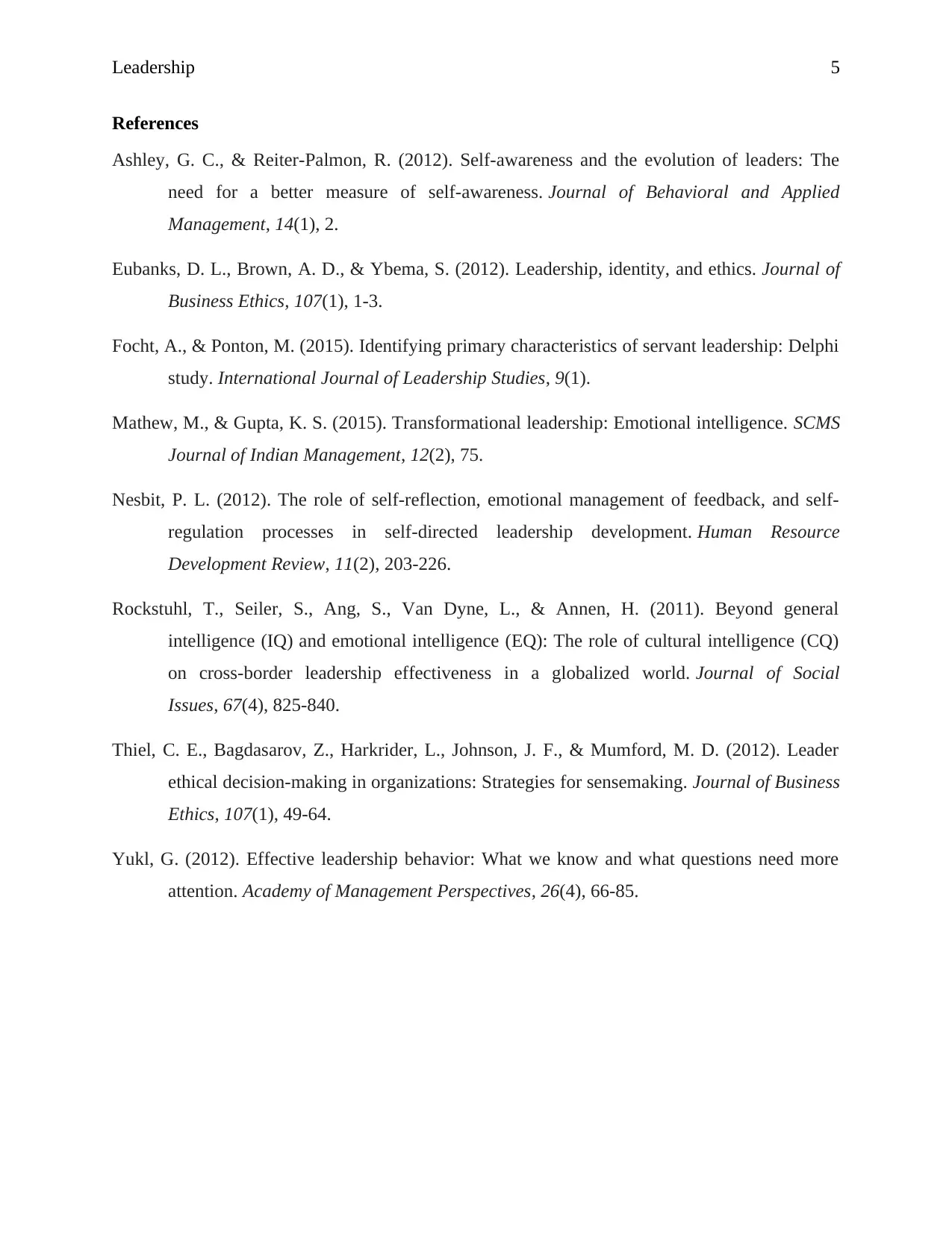Leadership in Business: Self-Assessment and Reflection Report
VerifiedAdded on 2022/10/10
|6
|1487
|187
Report
AI Summary
This report presents a self-reflection analysis of leadership styles in business management. It explores the importance of self-assessment for leadership development, focusing on characteristics of effective leaders and their strengths and weaknesses. The report discusses conscious leadership as ...

Leadership 1
Leadership in Business
Leadership in Business
Paraphrase This Document
Need a fresh take? Get an instant paraphrase of this document with our AI Paraphraser

Leadership 2
Introduction
This assessment relates to the self-reflection that based on the several styles of the
leadership used in business management. The self- assessment is very important for maintaining
the development and leadership in the organization. This assessment based on the self-reflection
that defines the various characteristics of a leader and its advantages. The strength and weakness
as a leader are discussed in this report. The leadership is one of the important parts of the
business and it increases the values of the business. The several leadership characteristics and the
impact of self-reflection defined further in this report.
Characteristics of the leadership defined by Mackey and Sisodia
The conscious leadership includes the several conscious leaders that possess the moral
courage and provide a proper safeguard to the business for future generations. The Mackey and
Sisodia, which based on conscious leadership (Eubanks, et al., 2012).The several characteristics
of leadership defined by Mackey and Sisodia are described below-define this statement-
Trust: The trust is an essential element in the conscious culture and it is an important part
of the leadership. The leaders need to maintain their trust among the employees and other
persons to manage the business process.
Love & Caring: The conscious leaders need to give love & care to the employees while
leading them. The leaders need to define the process to the employees with the proper
love and affection (Yukl, 2012).
Accountability: The leaders need to ensure that the team knows all people in the business
are accountable to the stakeholders of the organization. This is also a part of the
conscious leaders.
Transparency: In the conscious culture, the various secrets are included. The leaders
know these secrets and they accomplish all the tasks related to transparency.
Integrity: Integrity is very important in conscious leadership as this part is most relevant
to the people related to the business organization. This is main characteristic of conscious
leadership.
Introduction
This assessment relates to the self-reflection that based on the several styles of the
leadership used in business management. The self- assessment is very important for maintaining
the development and leadership in the organization. This assessment based on the self-reflection
that defines the various characteristics of a leader and its advantages. The strength and weakness
as a leader are discussed in this report. The leadership is one of the important parts of the
business and it increases the values of the business. The several leadership characteristics and the
impact of self-reflection defined further in this report.
Characteristics of the leadership defined by Mackey and Sisodia
The conscious leadership includes the several conscious leaders that possess the moral
courage and provide a proper safeguard to the business for future generations. The Mackey and
Sisodia, which based on conscious leadership (Eubanks, et al., 2012).The several characteristics
of leadership defined by Mackey and Sisodia are described below-define this statement-
Trust: The trust is an essential element in the conscious culture and it is an important part
of the leadership. The leaders need to maintain their trust among the employees and other
persons to manage the business process.
Love & Caring: The conscious leaders need to give love & care to the employees while
leading them. The leaders need to define the process to the employees with the proper
love and affection (Yukl, 2012).
Accountability: The leaders need to ensure that the team knows all people in the business
are accountable to the stakeholders of the organization. This is also a part of the
conscious leaders.
Transparency: In the conscious culture, the various secrets are included. The leaders
know these secrets and they accomplish all the tasks related to transparency.
Integrity: Integrity is very important in conscious leadership as this part is most relevant
to the people related to the business organization. This is main characteristic of conscious
leadership.

Leadership 3
As per the above characteristics defined by Mackey and Sisodia, it is analyzed
that these characteristics are not sufficient for the leadership in the business. The several
other characteristics are also important in the leadership as per my assessment. The
several other characteristics of leadership are like good communication skills, creativity,
innovation, and several capabilities to make certain decisions regarding the process. As
compared to above leadership characteristics, these are more essential to use in the
leadership process of business.
Importance of self-awareness ineffective conscious leadership
The self-awareness is very important in the leadership aspects as it makes the leaders
more cognizant of their actions. The self-awareness s very important in the leadership process as
it makes the leaders reliable as per the activities of the business (Focht and Ponton, 2015).The
self-awareness defines as an awareness of the own personality and it is an effort to invest the
proper understanding. The self-awareness is responsible to increase the overall strength to the
leaders and make them very effective in the business process.
The self-concept is an important task to maintain the leadership aspects in the business.
As the self-concept not only give strengths to the leaders but it also improves the performance of
the organization. Humility is one of the most important characteristics of self-aware leaders. It
maintains the process of conscious leadership.
The emotional intelligence is also an important part of the leadership and they create
more abilities to maintain conscious leadership (Nesbit, 2012). The emotional intelligence is an
important part of the business and it increases the effectiveness in the leadership style.
Results of the leadership
The self-awareness is the most important type of leadership as it improves the overall
leadership process in the business and increases the qualities of the leaders. As per the above test,
it is determined that self-awareness, self-concept and emotional intelligence. Each test gives
different directions in the business organization and improves the overall strategies of the
leadership in the business (Ashley and Reiter-Palmon, 2012). The self-awareness helps the
leaders to link their emotions and maintain effective interactions with others. This influences the
thoughts and behavior of the leaders.
As per the above characteristics defined by Mackey and Sisodia, it is analyzed
that these characteristics are not sufficient for the leadership in the business. The several
other characteristics are also important in the leadership as per my assessment. The
several other characteristics of leadership are like good communication skills, creativity,
innovation, and several capabilities to make certain decisions regarding the process. As
compared to above leadership characteristics, these are more essential to use in the
leadership process of business.
Importance of self-awareness ineffective conscious leadership
The self-awareness is very important in the leadership aspects as it makes the leaders
more cognizant of their actions. The self-awareness s very important in the leadership process as
it makes the leaders reliable as per the activities of the business (Focht and Ponton, 2015).The
self-awareness defines as an awareness of the own personality and it is an effort to invest the
proper understanding. The self-awareness is responsible to increase the overall strength to the
leaders and make them very effective in the business process.
The self-concept is an important task to maintain the leadership aspects in the business.
As the self-concept not only give strengths to the leaders but it also improves the performance of
the organization. Humility is one of the most important characteristics of self-aware leaders. It
maintains the process of conscious leadership.
The emotional intelligence is also an important part of the leadership and they create
more abilities to maintain conscious leadership (Nesbit, 2012). The emotional intelligence is an
important part of the business and it increases the effectiveness in the leadership style.
Results of the leadership
The self-awareness is the most important type of leadership as it improves the overall
leadership process in the business and increases the qualities of the leaders. As per the above test,
it is determined that self-awareness, self-concept and emotional intelligence. Each test gives
different directions in the business organization and improves the overall strategies of the
leadership in the business (Ashley and Reiter-Palmon, 2012). The self-awareness helps the
leaders to link their emotions and maintain effective interactions with others. This influences the
thoughts and behavior of the leaders.
⊘ This is a preview!⊘
Do you want full access?
Subscribe today to unlock all pages.

Trusted by 1+ million students worldwide

Leadership 4
The self-concept is also a main part of the conscious leadership and it is used to define
the proper concept to the leaders to develop the leadership qualities in the organization. This
concept used by the leaders to define the proper concept of the business to the employees. The
emotional-intelligence is very effective in the leadership process as it is the ability to define and
understand the emotions and this affects the other people of the organization (Thiel, et al., 2012).
Process of reflecting the values and attitudes by the self-assessment
By taking the assessments of the leadership, I have analyzed the proper knowledge
regarding the leadership process and improve the explanation of the leadership used in the
business organization (Mathew and Gupta, 2015). By self- assessment, I have analyzed that, I
gained the value and use of leadership in the organization. The organization improves its
business by using the self-assessment regarding the leadership and this increases the overall
process of the organization. The overall attitude and behavior of the leaders get improved by
using the overall process of leadership.
Significance of the self-assessment results
The self-assessment gives the various capabilities in the business organization and it
increases the overall process of the leadership in the business organization. The self-assessment
is very beneficial for the organization. The results get by the self-assessment is very beneficial as
it gives large information about leadership and improves the several abilities of the leaders
(Rockstuhl, et al., 2011).The gap occurred in the knowledge is easily identified with the help of
the self-assessment. In the aspects of leadership, the self-assessment is very necessary and it
increases the knowledge of the leadership used in the organization.
Conclusion
This report includes the self-reflection and the several aspects of the leadership used in
the business organization. The self-awareness, self-concept and emotional intelligence are very
important in the organization and it improves the leadership process in the business. The report
defines the several characteristics of leadership defined by the Mackey and Sisodia and the
comparison of the characteristics achieved by the self-assessment. All the corrections are quickly
achieved by adopting the leadership aspects and analyze the various issues get by the self-
reflection of the leadership. This report gives several processes of the leadership used in the
business.
The self-concept is also a main part of the conscious leadership and it is used to define
the proper concept to the leaders to develop the leadership qualities in the organization. This
concept used by the leaders to define the proper concept of the business to the employees. The
emotional-intelligence is very effective in the leadership process as it is the ability to define and
understand the emotions and this affects the other people of the organization (Thiel, et al., 2012).
Process of reflecting the values and attitudes by the self-assessment
By taking the assessments of the leadership, I have analyzed the proper knowledge
regarding the leadership process and improve the explanation of the leadership used in the
business organization (Mathew and Gupta, 2015). By self- assessment, I have analyzed that, I
gained the value and use of leadership in the organization. The organization improves its
business by using the self-assessment regarding the leadership and this increases the overall
process of the organization. The overall attitude and behavior of the leaders get improved by
using the overall process of leadership.
Significance of the self-assessment results
The self-assessment gives the various capabilities in the business organization and it
increases the overall process of the leadership in the business organization. The self-assessment
is very beneficial for the organization. The results get by the self-assessment is very beneficial as
it gives large information about leadership and improves the several abilities of the leaders
(Rockstuhl, et al., 2011).The gap occurred in the knowledge is easily identified with the help of
the self-assessment. In the aspects of leadership, the self-assessment is very necessary and it
increases the knowledge of the leadership used in the organization.
Conclusion
This report includes the self-reflection and the several aspects of the leadership used in
the business organization. The self-awareness, self-concept and emotional intelligence are very
important in the organization and it improves the leadership process in the business. The report
defines the several characteristics of leadership defined by the Mackey and Sisodia and the
comparison of the characteristics achieved by the self-assessment. All the corrections are quickly
achieved by adopting the leadership aspects and analyze the various issues get by the self-
reflection of the leadership. This report gives several processes of the leadership used in the
business.
Paraphrase This Document
Need a fresh take? Get an instant paraphrase of this document with our AI Paraphraser

Leadership 5
References
Ashley, G. C., & Reiter-Palmon, R. (2012). Self-awareness and the evolution of leaders: The
need for a better measure of self-awareness. Journal of Behavioral and Applied
Management, 14(1), 2.
Eubanks, D. L., Brown, A. D., & Ybema, S. (2012). Leadership, identity, and ethics. Journal of
Business Ethics, 107(1), 1-3.
Focht, A., & Ponton, M. (2015). Identifying primary characteristics of servant leadership: Delphi
study. International Journal of Leadership Studies, 9(1).
Mathew, M., & Gupta, K. S. (2015). Transformational leadership: Emotional intelligence. SCMS
Journal of Indian Management, 12(2), 75.
Nesbit, P. L. (2012). The role of self-reflection, emotional management of feedback, and self-
regulation processes in self-directed leadership development. Human Resource
Development Review, 11(2), 203-226.
Rockstuhl, T., Seiler, S., Ang, S., Van Dyne, L., & Annen, H. (2011). Beyond general
intelligence (IQ) and emotional intelligence (EQ): The role of cultural intelligence (CQ)
on cross‐border leadership effectiveness in a globalized world. Journal of Social
Issues, 67(4), 825-840.
Thiel, C. E., Bagdasarov, Z., Harkrider, L., Johnson, J. F., & Mumford, M. D. (2012). Leader
ethical decision-making in organizations: Strategies for sensemaking. Journal of Business
Ethics, 107(1), 49-64.
Yukl, G. (2012). Effective leadership behavior: What we know and what questions need more
attention. Academy of Management Perspectives, 26(4), 66-85.
References
Ashley, G. C., & Reiter-Palmon, R. (2012). Self-awareness and the evolution of leaders: The
need for a better measure of self-awareness. Journal of Behavioral and Applied
Management, 14(1), 2.
Eubanks, D. L., Brown, A. D., & Ybema, S. (2012). Leadership, identity, and ethics. Journal of
Business Ethics, 107(1), 1-3.
Focht, A., & Ponton, M. (2015). Identifying primary characteristics of servant leadership: Delphi
study. International Journal of Leadership Studies, 9(1).
Mathew, M., & Gupta, K. S. (2015). Transformational leadership: Emotional intelligence. SCMS
Journal of Indian Management, 12(2), 75.
Nesbit, P. L. (2012). The role of self-reflection, emotional management of feedback, and self-
regulation processes in self-directed leadership development. Human Resource
Development Review, 11(2), 203-226.
Rockstuhl, T., Seiler, S., Ang, S., Van Dyne, L., & Annen, H. (2011). Beyond general
intelligence (IQ) and emotional intelligence (EQ): The role of cultural intelligence (CQ)
on cross‐border leadership effectiveness in a globalized world. Journal of Social
Issues, 67(4), 825-840.
Thiel, C. E., Bagdasarov, Z., Harkrider, L., Johnson, J. F., & Mumford, M. D. (2012). Leader
ethical decision-making in organizations: Strategies for sensemaking. Journal of Business
Ethics, 107(1), 49-64.
Yukl, G. (2012). Effective leadership behavior: What we know and what questions need more
attention. Academy of Management Perspectives, 26(4), 66-85.

Leadership 6
⊘ This is a preview!⊘
Do you want full access?
Subscribe today to unlock all pages.

Trusted by 1+ million students worldwide
1 out of 6
Related Documents
Your All-in-One AI-Powered Toolkit for Academic Success.
+13062052269
info@desklib.com
Available 24*7 on WhatsApp / Email
![[object Object]](/_next/static/media/star-bottom.7253800d.svg)
Unlock your academic potential
© 2024 | Zucol Services PVT LTD | All rights reserved.




